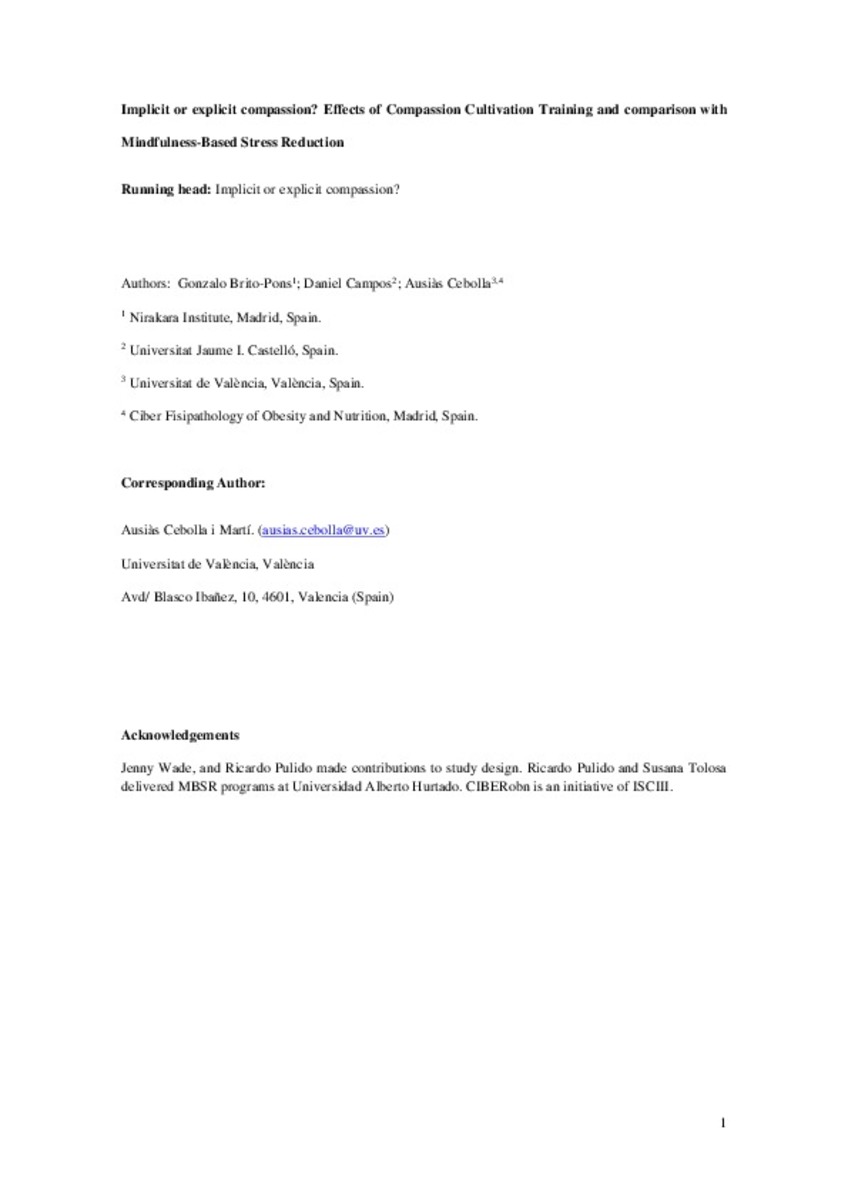Mostrar el registro sencillo del ítem
Implicit or Explicit Compassion? Effects of Compassion Cultivation Training and Comparison with Mindfulness-based Stress Reduction
| dc.contributor.author | Brito-Pons, Gonzalo | |
| dc.contributor.author | Campos, Daniel | |
| dc.contributor.author | Cebolla Marti, Ausias | |
| dc.date.accessioned | 2018-11-26T10:19:53Z | |
| dc.date.available | 2018-11-26T10:19:53Z | |
| dc.date.issued | 2018 | |
| dc.identifier.citation | Brito-Pons, G., Campos, D. & Cebolla, A. Mindfulness (2018) 9: 1494. https://doi.org/10.1007/s12671-018-0898-z | ca_CA |
| dc.identifier.issn | 1868-8527 | |
| dc.identifier.issn | 1868-8535 | |
| dc.identifier.uri | http://hdl.handle.net/10234/177651 | |
| dc.description.abstract | Mindfulness-based interventions generally include compassion implicitly, but it remains to be seen whether implicit compassion training can be effective, or if it needs to be trained explicitly through specific meditations and relational practices. This research study had two specific goals. The first was to expand the literature on the effects of compassion-based interventions (CBIs) by assessing the impact of the Compassion Cultivation Training program (CCT) on anxiety, depression, stress, life satisfaction, happiness, mindfulness, empathy, self-compassion, compassion for others, and identification with all humanity, through a waitlist randomized controlled trial in a community sample (study 1). Secondly, this research addressed the following question: Does a CBI—an explicit compassion training—have a differential impact in terms of empathy, compassion, and identification with all humanity, compared to a mindfulness-based intervention (mindfulness-based stress reduction (MBSR)) in which compassion is taught implicitly? (study 2). Groups were assessed at baseline, post-intervention, and 2-month follow-up, and analyses involved repeated-measures of analysis of variance (ANOVA) for group contrasts. Compared to the wait-list group, CCT participants showed significant improvements in psychological well-being (decreased depression and stress, increases in life satisfaction, happiness, mindfulness, and self-compassion) and compassion skills. Both MBSR and CCT were effective in generally enhancing psychological well-being and increasing mindfulness and compassion, but CCT had a greater impact on developing compassionate skills, especially empathic concern and identification with all humanity. This research highlights the potential for a complementary (rather than competitive) relationship between mindfulness- and compassion-based interventions. | ca_CA |
| dc.format.extent | 32 p. | ca_CA |
| dc.format.mimetype | application/pdf | ca_CA |
| dc.language.iso | eng | ca_CA |
| dc.publisher | Springer Verlag | ca_CA |
| dc.relation.isPartOf | Mindfulness (2018) 9 | ca_CA |
| dc.rights | © Springer Science+Business Media, LLC, part of Springer Nature 2018 “This is a post-peer-review, pre-copyedit version of an article published in Mindfulness. The final authenticated version is available online at: http://dx.doi.org/10.1007/s12671-018-0898-z” | ca_CA |
| dc.rights.uri | http://rightsstatements.org/vocab/InC/1.0/ | * |
| dc.subject | Compassion | ca_CA |
| dc.subject | Mindfulness | ca_CA |
| dc.subject | Empathy | ca_CA |
| dc.subject | Meditation | ca_CA |
| dc.subject | Training | ca_CA |
| dc.title | Implicit or Explicit Compassion? Effects of Compassion Cultivation Training and Comparison with Mindfulness-based Stress Reduction | ca_CA |
| dc.type | info:eu-repo/semantics/article | ca_CA |
| dc.identifier.doi | https://doi.org/10.1007/s12671-018-0898-z | |
| dc.rights.accessRights | info:eu-repo/semantics/openAccess | ca_CA |
| dc.relation.publisherVersion | https://link.springer.com/article/10.1007/s12671-018-0898-z | ca_CA |
| dc.date.embargoEndDate | 2019-02-09 | |
| dc.type.version | info:eu-repo/semantics/acceptedVersion | ca_CA |
Ficheros en el ítem
Este ítem aparece en la(s) siguiente(s) colección(ones)
-
PSB_Articles [1305]
Articles de publicacions periòdiques







